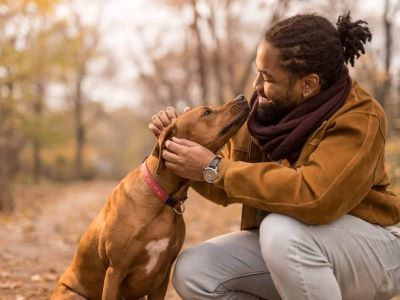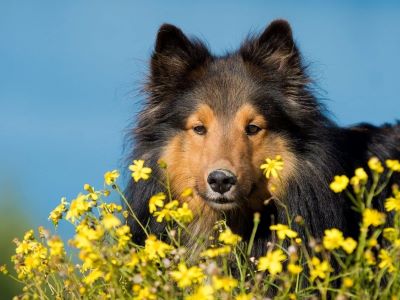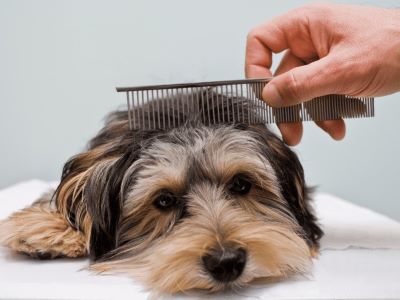If you’ve ever thought about the query of, “Why does my dog lick my ears?” feel comfort in knowing that you are not alone in this pondering.
Dogs possess a distinct talent for displaying affection and forming bonds with their human friends.
A fascinating behaviour that may confuse owners is their eagerness to gently touch our ears.
Within this composition, we shall dive into the numerous reasonable justifications for this endearing yet unexpected conduct and the possible implications it may hold.

Key Takeaways
- Ear licking is a part of dogs’ complex communication[1] methods.
- When your dog licks your ears, it’s a sign of love and loyalty, contributing to a stronger bond between you and your furry friend.
- Dogs use licking as a way to explore and understand their environment.
- While ear licking is generally harmless, setting boundaries and redirecting the behaviour when needed ensures a comfortable interaction between you and your dog.
Understanding Canine Communication
Dogs have a unique ability to showcase affection and establish a bond with their human buddies. One intriguing tendency that might puzzle humans is their enthusiastic habit of licking our precious ears
In case you’ve ever wondered, “Why does my furry dog lick my ears?” take comfort in knowing that you’re not alone.
Dogs are the rulers of body language and they use it to show a wide range of emotions and intentions. From wagging tails to erect ears, each moment contains a separate significance.

Barks, growls and howls are all part of the vocal repository. While licking can be considered as a non-vocal behaviour. Paying attention to the sounds your dog makes while licking can help you to understand them better.
Dogs are highly emotional beings, and their behaviour often reflects their feeling.
Trust is fundamental in any relationship, and dogs can build trust through constant positive interactions.
Within this write-up, we shall explore numerous reasons behind this adorable yet unexpected conduct and the possible implications it may hold.
Why Does My Dog Lick My Ears?
Puppies’ solution to a few fairly strong dog behaviours that have been handed down through generations. Using nature, dogs are, particularly social animals and some of the matters they do are related to the precise ways that dogs speak and socialize.

If your dog licks your ears, they will be signalling a high level of comfort. Mutual grooming is commonplace among members, and you’ll be aware as just one of them.
Licking your ears can also be a sign of affection, care and admiration. In other words, when your furry mate licks your ears, they’re complimenting you!
Affection & Bonding
Our fluffy buddy may join in the action of licking your ears for different reasons, with one notable motive being to showcase fondness and strengthen the bond between both of you.
Doggy friends frequently view their human counterparts as essential members of their pack, and the soft act of licking acts as a sincere display of love and firm devotion.
When your cherished dog pampers your ears with affectionate licks, it signifies that they feel relaxed and profoundly linked to you.

Sensory Exploration and Curiosity
Dogs embark on a thrilling journey of discovery through their senses, and the act of licking plays a vital role in this expedition.
Whenever your furry companion affectionately licks your ears, their motivations may come from a deep curiosity towards the diverse impression of scents and flavours they stumble upon.
The nose, keeps a thought of a distinctive aroma owing to the presence of natural oils and perspiration, becoming an attractive realm for the good judgement related to the senses by which a dog can smell the abilities.

Grooming Behaviour
Dogs possess natural grooming tendencies, and engaging in licks acts as a means of self-pampering and demonstrating care towards their human mates.
When your furry friend licks your ears, it could signify their inclination to groom you, thus strengthening the social connection between you both.
This conduct is frequently observed in dogs with protective instincts or that originate from breeds deeply twisted with human companionship.

Anxiety or Comfort-Seeking
Dogs occasionally engage in the behaviour of gently loving their owner’s ears to relieve their inner confusion and relieve feelings of unease.
This act of affectionate licking triggers the release of delightful endorphins, which in turn favors a calm state of mind.
“The most dangerous symptom of dog anxiety is aggression. Said Rando Kriss in the American Kannel Club“
Should your companion exhibit an inclination for showering your ears with affection during moments of heightened stress, it may serve as an indication of their profound desire for solace and reassurance.
Dogs flourish through receiving attention, and the act of licking can serve as a method for them to attract notice.
If your canine companion engages in the act of licking your ears and receives a favourable reaction, such as being gently touched or receiving a verbal talk, they may persist in this behaviour as a way of seeking both attention and affection.
How to Respond to Ear Licking?
Ear licking, while generally harmless and potentially a display of affection, necessitates the establishment of boundaries to facilitate a pleasant interaction for both the dog and yourself.
If you derive pleasure from this behaviour, respond with tender affection. Otherwise, if ear licking causes discomfort, redirect your dog’s focus towards a more suitable action and acknowledge their improved behaviour through rewarding incentives.
Dogs accept positive boosting training techniques. This means when you reward them for good behaviour, they are more likely to repeat it. But by not giving any reactions to bad behaviours or unwanted attention, they will learn to not repeat them.
When your dog licks your ears, try to remain as neutral as possible. Just get up and redirect their attention to something else. Allow them to replace the lick with something positive that rewards them. Over time (and just with consistency and patience), your dog will lick your ears less often.

FAQs
Why does my dog lick my ears?
Dogs may lick their ears as a form of expressing affection, grooming behaviour, or seeking attention and comfort. It can also be a way of exploring scents and tastes in their environment.
Is ear licking a sign of submission or respect from my dog?
Yes, in the canine world, licking is often associated with submission. If your dog licks your ears, it might signify respect for your role as the pack leader.
Should I be concerned if my dog licks my ears excessively?
Excessive licking, especially if it leads to discomfort, may be a sign of anxiety or a behavioural issue. If you’re concerned, consult with a veterinarian to rule out any underlying health problems.
Can I train my dog to stop licking my ears if I find it uncomfortable?
Yes, you can redirect your dog’s behaviour through positive reinforcement. Offer an alternative behaviour and reward them when they follow the new cue. Consistency is key in training.
Is ear licking a common behaviour in all dog breeds?
Yes, ear licking is a common behaviour across various dog breeds. However, the frequency and intensity of the behaviour can vary based on individual temperament and upbringing.
Final Thoughts
To sum up, there are numerous explanations for the inquiry, “Why does my dog lick my ear?” This unusual behaviour surrounds a wide range of motives, such as demonstrating fondness and interest, involving comfort, or displaying submission.
It is fascinating how dogs communicate through this complicated yet adorable act of licking ears. By comprehending the diverse reasons behind this conduct, you have the opportunity to fortify the connection with your beloved four-legged companion and naturally navigate the area of companion affection.
Reference:
- Dog communication and body language – collaborative for shelter dogs. (n.d.).



